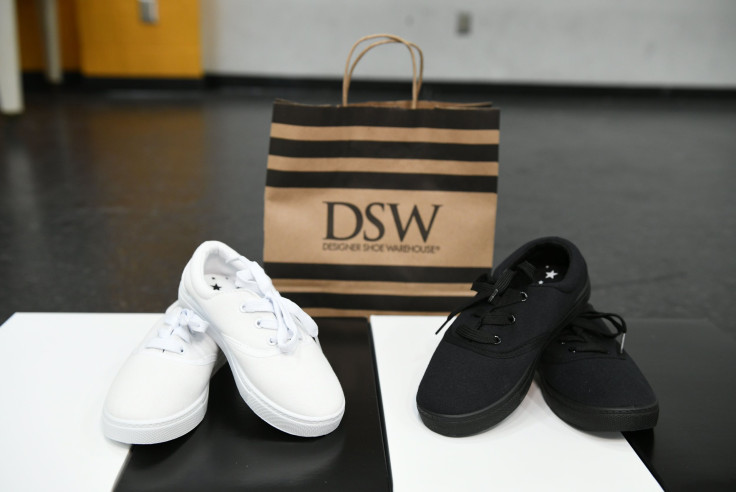Designer Brands' DSW Outpaces Drag Of Acquisitions

Footwear and accessories retailer Designer Brands (NYSE:DBI) moves from strength to strength at DSW, with retail sales surging by double-digit rates in its fiscal first quarter. And though it also reported a surprise profit at its new Canadian Shoe Store business, the Camuto Group acquisition continues to drag down the whole.
Although the market reacted positively to Designer Brands' beat-and-raise quarter, at one point sending shares over 14% higher, it seems the initial enthusiasm wore off as the day progressed, because the stock closed up around 6% and ended the following day down 5%. It's essentially where it started before the earnings were issued.
Leery of change
There are good reasons for investor reevaluation. DSW remains the footwear retailer's powerhouse, delivering strong comparable sales over last year's already strong comps and improving gross profit rates by seven-tenths of a percentage point. It also helped boost operating income 12% for Designer Brands' legacy business, which includes DSW and Affiliated Business Group.
Its strength is one of the reasons many were so leery of the new direction it took. Acquiring the Shoe Store business was one thing since DSW had a long-standing relationship with the Canadian retailer and owned a substantial portion of the business already. But also acquiring Camuto, which was a dysfunctional designer and wholesaler with myriad problems in its operations, raised yellow flags for many.
And where the Shoe Store did better than many expected, turning its first profit in five years and registering a nearly 1% increase in comps, Camuto continues to generate losses. Designer Brands is still trying to overcome the significant hole the wholesaler dug for itself when it burned bridges with customers from late deliveries and order cancellations. Although Designer Brands continues to cheerlead for the business' turnaround, it's going to be a slow slog if it ever does come to pass.
An anchor on progress
Camuto generated net sales of $100.9 million in the first quarter, lower than the year-ago period, which was before Designer Brands owned it. It did see comps of 46% at the Vince Camuto website but admits sales are stuck at $50 million annually. Gross margin is also very weak at 21.8%, and that won't begin to improve until the fall at the earliest.
It also says the first half of 2019 is going to be difficult for Camuto, because there are long lead times in manufacturing footwear and there's a long mountain to climb in regaining the trust of customers Camuto burned.
The designer has very high fixed expenses that offer little maneuverability, and its wholesale business generates the bulk of its revenue but contributes very little to operating income. The first-cost business, where it buys the inventory directly from suppliers but sells it at various ports to customers who then import it to the U.S., is much more profitable. While Designer Brands is looking to grow it, it generated just $3.7 million in the first quarter.
There is potential though
It's not all bad with Camuto and some of the potential the acquisition can provide Designer Brands was also visible in the quarter. For example, one of Camuto's department store customers saw disappointing sell-through with one particular shoe design and where it would have offloaded the shoe to a closeout business and received a credit from Camuto, now it retook possession of the shoe and distributed it through DSW and Shoe Company. Not only did it not have to issue a vendor allowance to the department store, but it's likely to gain a higher recovery rate on the shoe's eventual sale.
Designer Brands was also able to shift the manufacture of gifts that it gives away with a purchase to Camuto from third-party manufacturers, saving Designer Brands money, while Camuto was similarly able to take some replenishment orders for fall delivery of some existing private-label product for its first-cost business that is currently produced by a third-party.
Camuto also gives Designer Brands a chance to move production out of China to get around tariff increases, because Camuto has factories in 13 countries.
Tough quarters ahead
Whether those benefits are enough to just the drag it places the rest of the business remains to be seen, but because the DSW brand outshines all it keeps the retailer moving forward.
Yet Designer Brands will now be lapping some difficult comparables in the quarters ahead. The kids footwear that has proved so popular for it was launched a year ago and will be difficult to replicate the sales momentum while its VIP rewards program was also updated last year, which allowed it to recognize $8 million in related reserves that won't repeat.
In all, the first quarter may be the high point for Designer Brands until at least 2020.
This article originally appeared in The Motley Fool.
Rich Duprey has no position in any of the stocks mentioned. The Motley Fool recommends Designer Brands Inc. The Motley Fool has a disclosure policy.




















